Test engineers play a critical role in ensuring the quality and reliability of software products. They are responsible for identifying bugs, verifying functionality, and ensuring that the software meets the specified requirements before it reaches the end-users.
Test engineering skills include a strong understanding of testing methodologies, proficiency in automation tools, and the ability to write and execute test cases. Additionally, skills like analytical thinking and attention to detail are crucial for success in this role.
Candidates can write these abilities in their resumes, but you can’t verify them without on-the-job Test Engineer skill tests.
In this post, we will explore 8 essential Test Engineer skills, 8 secondary skills and how to assess them so you can make informed hiring decisions.
Table of contents
8 fundamental Test Engineer skills and traits
The best skills for Test Engineers include Test Automation, Bug Tracking, Performance Testing, Security Testing, API Testing, Version Control, Test Planning and Continuous Integration.
Let’s dive into the details by examining the 8 essential skills of a Test Engineer.
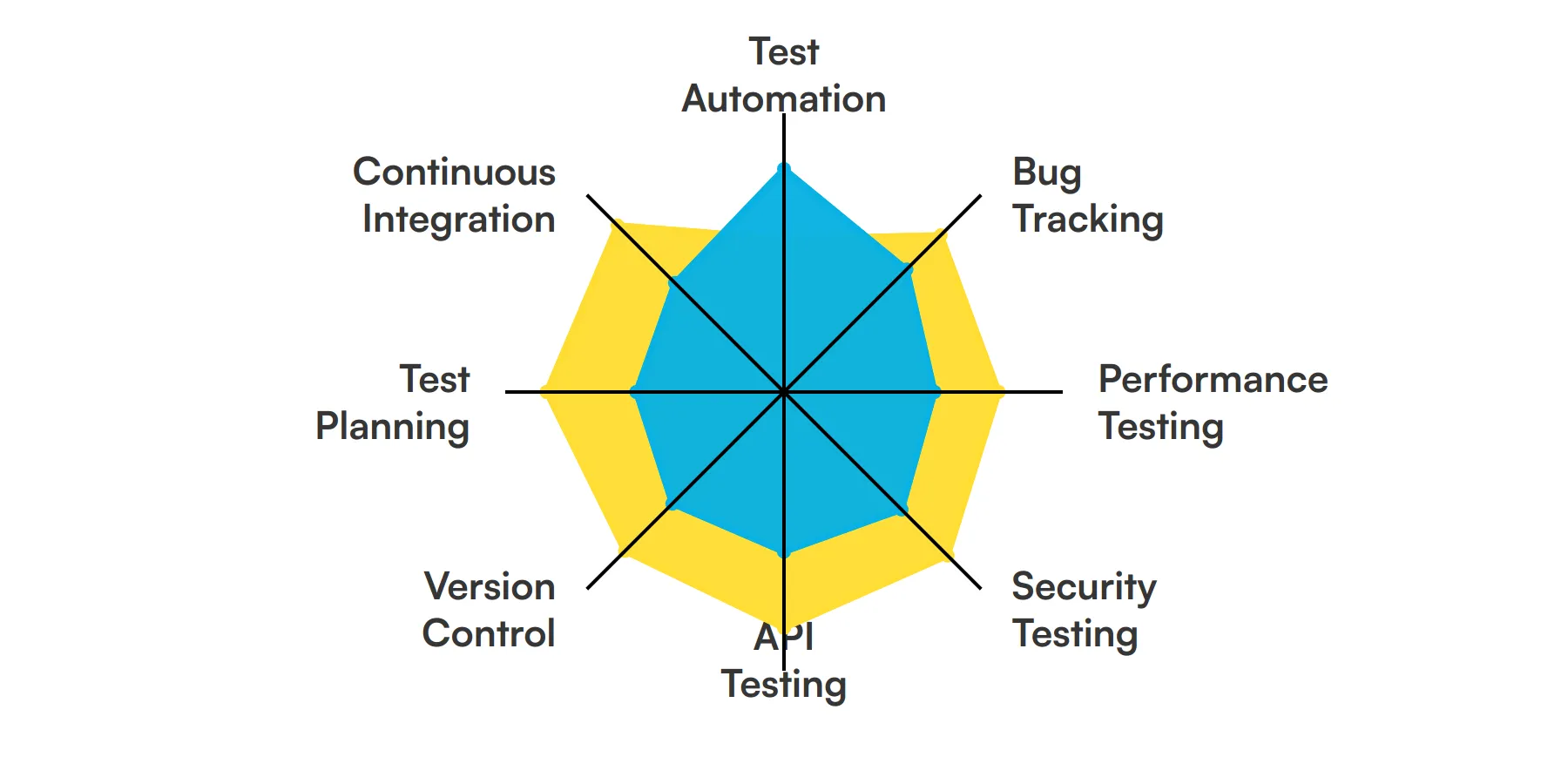
Test Automation
Test automation is a core skill for a Test Engineer, enabling them to write scripts that perform automated testing on software applications. This skill helps in reducing manual testing efforts and ensures consistency in test execution, which is crucial for iterative development processes.
For more insights, check out our guide to writing a Selenium Automation Tester Job Description.
Bug Tracking
A Test Engineer uses bug tracking to manage and record issues found during testing phases. Proficiency in tools like JIRA or Bugzilla allows the engineer to streamline the process of reporting, tracking, and resolving defects, which enhances the overall quality of the product.
Performance Testing
Performance testing involves assessing the speed, responsiveness, and stability of a system under a particular workload. For a Test Engineer, mastering this skill ensures that the software can handle expected traffic and data processing needs, preventing downtime or degradation in user experience.
Security Testing
Security testing is critical as it identifies vulnerabilities in software before it goes live. A Test Engineer with this skill can safeguard applications against potential attacks, protecting both company data and user privacy.
Check out our guide for a comprehensive list of interview questions.
API Testing
API testing is essential to ensure that the application programming interfaces meet functionality, reliability, performance, and security expectations. Test Engineers need this skill to validate the integral building blocks of software applications, which often rely on API interactions.
Version Control
Familiarity with version control systems like Git is necessary for Test Engineers to manage changes to the test scripts and source code. This skill helps in maintaining a history of modifications and collaborating effectively with other team members.
Test Planning
Test planning involves defining the scope and approach of the testing activities. A Test Engineer with strong planning skills ensures that all features are adequately covered by tests, aligning with the project goals and timelines.
Continuous Integration
Continuous integration (CI) practices are integral for a Test Engineer to integrate their work frequently with the main branch. This skill helps in identifying defects early in the development cycle, reducing the integration problems and allowing for quicker software releases.
8 secondary Test Engineer skills and traits
The best skills for Test Engineers include SQL, Risk Management, Agile Methodologies, Usability Testing, Cross-platform Testing, Communication, Documentation and Problem Solving.
Let’s dive into the details by examining the 8 secondary skills of a Test Engineer.
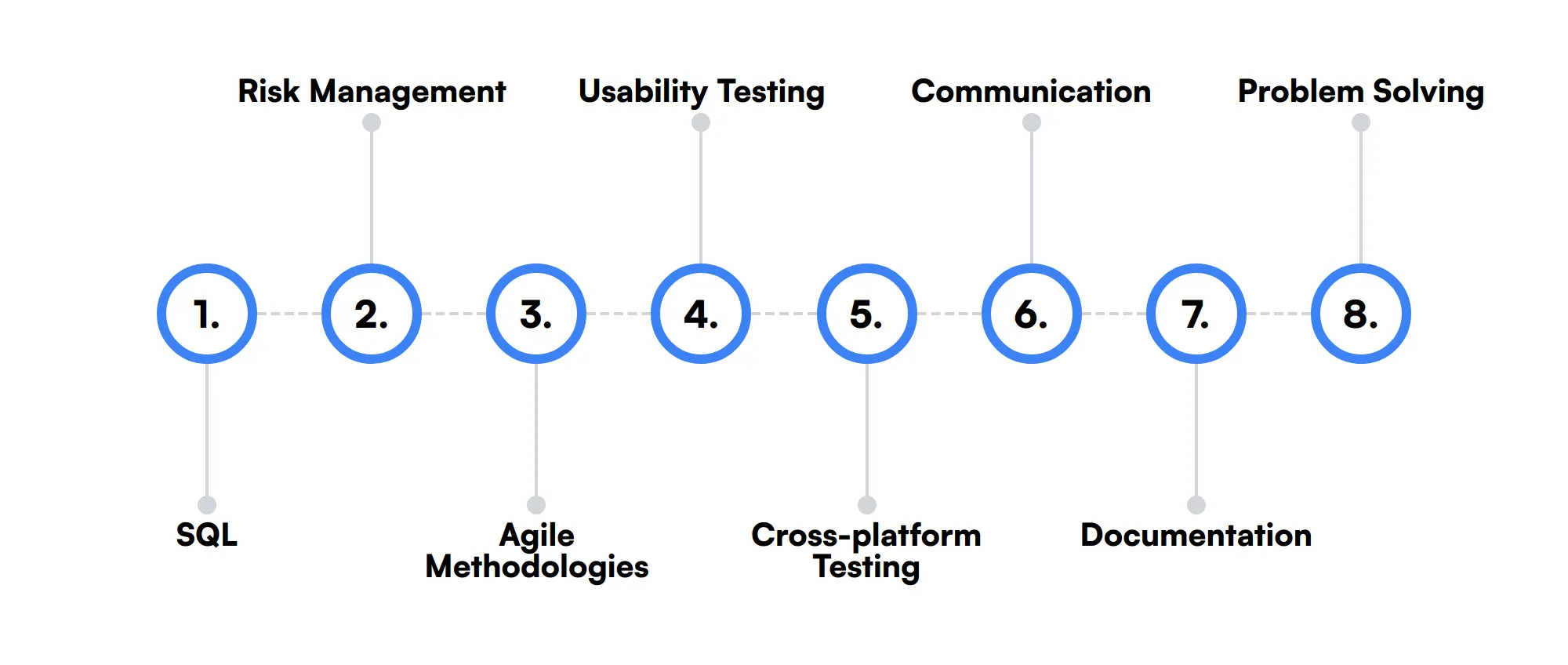
SQL
Understanding SQL is beneficial for Test Engineers when they need to validate data integrity and perform back-end testing. This skill helps in checking whether the front-end data is correctly stored in the database.
Risk Management
Risk management enables Test Engineers to prioritize testing efforts based on the potential impact of defects. This approach helps in optimizing resources and focusing on areas that are critical to the system’s performance and security.
Agile Methodologies
Knowledge of Agile methodologies is useful for Test Engineers as it helps them adapt to rapid development environments and collaborate effectively with cross-functional teams.
Usability Testing
Usability testing focuses on evaluating the user interface and user experience of software products. A Test Engineer with this skill can provide insights into the intuitive design and user satisfaction.
Cross-platform Testing
Cross-platform testing ensures that applications function correctly across different devices and operating systems. This skill is important for Test Engineers to guarantee a consistent user experience, regardless of the platform used.
Communication
Effective communication is key for Test Engineers to convey test results, explain bugs, and collaborate with developers and other stakeholders to ensure clarity and understanding throughout the testing process.
Documentation
Proper documentation skills are necessary for Test Engineers to create clear and detailed test cases, reports, and outcomes that are understandable and useful for future reference and compliance needs.
Problem Solving
Problem-solving skills help Test Engineers to quickly identify the causes of software issues and determine the best solutions, ensuring the stability and functionality of the application.
How to assess Test Engineer skills and traits
Assessing the skills and traits of a Test Engineer can be a challenging task, given the diverse range of competencies required for the role. From Test Automation and Bug Tracking to Performance Testing and Security Testing, a Test Engineer must be proficient in various areas to ensure the quality and reliability of software products.
Traditional resumes and interviews often fall short in evaluating these multifaceted skills. This is where skills-based assessments come into play. They provide a more accurate measure of a candidate's abilities and fit for the role. For instance, Adaface assessments can help you achieve a 2x improved quality of hires by focusing on real-world scenarios and practical skills.
When assessing Test Engineers, it's important to consider their expertise in API Testing, Version Control, Test Planning, and Continuous Integration. These skills are critical for ensuring that software systems function correctly and efficiently. By leveraging targeted assessments, you can better understand a candidate's strengths and areas for improvement, ultimately making more informed hiring decisions.
Let’s look at how to assess Test Engineer skills with these 6 talent assessments.
Selenium Online Test
Our Selenium Online Test evaluates a candidate's ability to use Selenium Webdriver for automation testing. This includes interactions with live websites, cross-browser testing, and building various testing frameworks.
The test assesses their understanding of Selenium architecture, API testing, and performance testing capabilities. It challenges candidates to demonstrate their skills in creating and customizing reports and testing databases with Selenium.
Successful candidates will show proficiency in developing and managing data-driven and hybrid frameworks, essential for advanced testing scenarios.
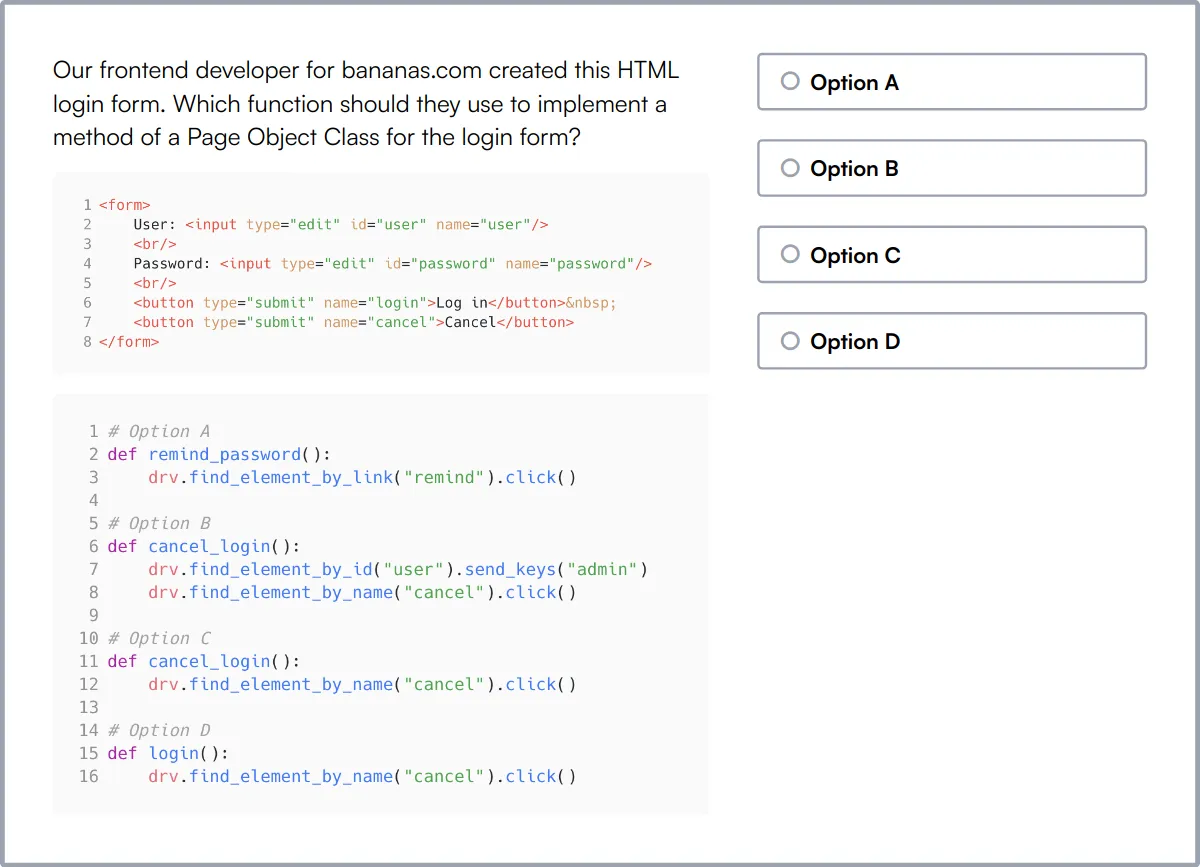
Jira Online Test
Our Jira Online Test measures a candidate's expertise in using Jira Software Cloud, focusing on Agile methodologies such as Scrum and Kanban.
This test evaluates knowledge in managing backlogs, sprints, and configuring Agile boards. It also tests the candidate's ability to administer Jira effectively.
Candidates proficient in these areas are well-equipped to handle project management tasks efficiently, ensuring smooth workflow transitions and effective sprint planning.
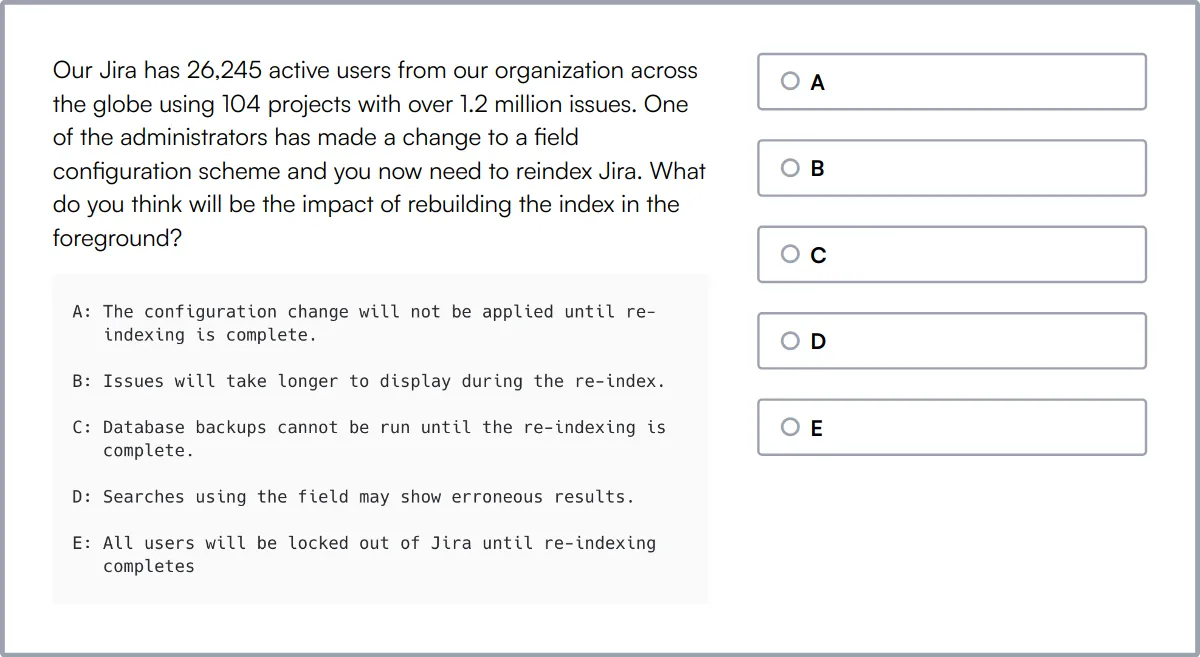
Web Testing
Our Web Testing focuses on evaluating candidates' abilities in web testing, including the use of tools like Selenium and fundamental manual testing techniques.
The test covers web testing fundamentals, designing tests, and the practical application of QA tools to ensure thorough web application testing.
High-scoring candidates demonstrate a strong grasp of both automated and manual testing techniques, crucial for comprehensive web application quality assurance.
Penetration Testing Test
Our Penetration Testing Test assesses a candidate's skills in network security, ethical hacking, and vulnerability assessment.
Candidates are tested on their ability to conduct thorough penetration tests, identify security vulnerabilities, and suggest remedial measures.
Those who excel in the test are adept at enhancing the security posture of systems and applications, demonstrating advanced knowledge in web application security.
REST API Test
Our REST API Test evaluates a candidate's understanding of RESTful API design and integration, including backend service architecture.
The test includes questions on REST principles, HTTP methods, and API security practices, assessing the candidate's ability to design and interact with APIs.
Candidates who perform well can effectively manage API integrations and understand the technical nuances of backend services, which are critical for modern software development.
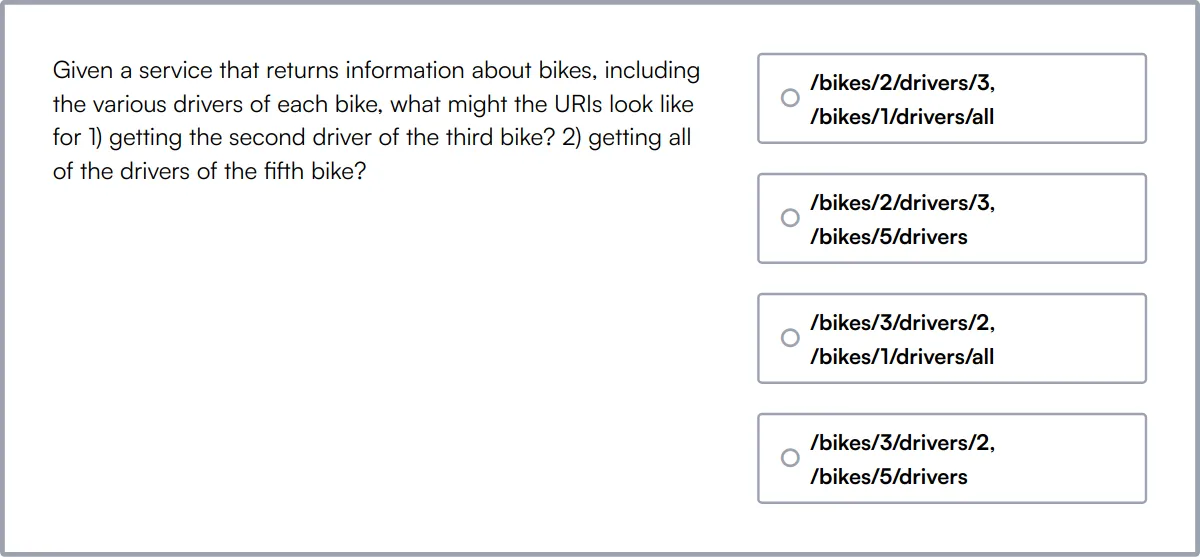
Git Online Test
Our Git Online Test gauges a candidate's proficiency with Git, covering repository management, branching, merging, and conflict resolution.
This test evaluates the candidate's understanding of Git commands, workflows, and best practices for source code management.
Effective candidates demonstrate the ability to manage complex codebases and maintain version control with precision, ensuring smooth development processes.
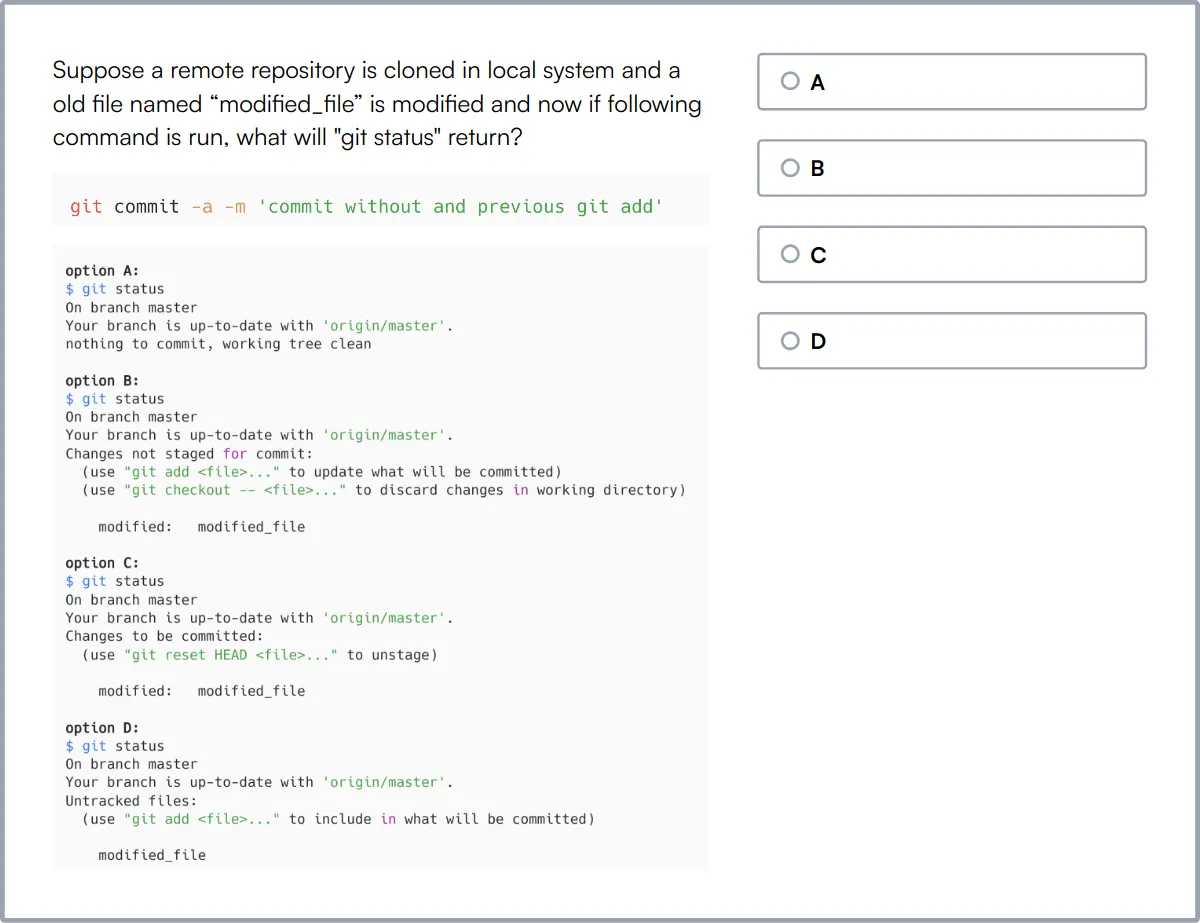
Summary: The 8 key Test Engineer skills and how to test for them
| Test Engineer skill | How to assess them |
|---|---|
| 1. Test Automation | Evaluate the ability to create and maintain automated test scripts. |
| 2. Bug Tracking | Check proficiency in identifying, documenting, and managing software defects. |
| 3. Performance Testing | Assess skills in measuring and optimizing system performance under load. |
| 4. Security Testing | Determine capability to identify and mitigate security vulnerabilities. |
| 5. API Testing | Gauge expertise in testing and validating APIs for functionality and reliability. |
| 6. Version Control | Review experience in using version control systems for code management. |
| 7. Test Planning | Evaluate the ability to design comprehensive and effective test plans. |
| 8. Continuous Integration | Check familiarity with integrating code changes into a shared repository. |
Backend Engineer Online Test
Test Engineer skills FAQs
What skills should a Test Engineer have for effective Test Automation?
A Test Engineer should be proficient in programming languages like Java or Python, understand automation frameworks such as Selenium or Cypress, and have experience with tools like Jenkins for integrating automation into the CI/CD pipeline.
How can recruiters assess a candidate's proficiency in Bug Tracking?
Recruiters can evaluate a candidate's bug tracking skills by discussing their experience with tools like JIRA or Bugzilla, and asking for specific examples of how they have managed and resolved bugs in past projects.
What are key indicators of expertise in Performance and Security Testing?
Expertise in Performance Testing can be indicated by familiarity with load testing tools like LoadRunner or JMeter. For Security Testing, knowledge of security protocols, vulnerability assessment tools like OWASP ZAP, and a clear understanding of secure coding practices are good indicators.
Why is knowledge of SQL important for a Test Engineer?
SQL skills are important for Test Engineers to validate data integrity and interact with databases directly to verify test outcomes. This skill helps in checking the effects of tests on database operations.
What should a Test Engineer know about Agile Methodologies?
A Test Engineer should understand Agile principles, be able to work in short sprints, and adapt to rapid changes. Familiarity with Scrum or Kanban, and tools like Trello or Asana, can also be beneficial.
How does Continuous Integration benefit a Test Engineer's workflow?
Continuous Integration helps Test Engineers by automating the testing and build processes, reducing manual effort, and ensuring that new code commits do not break existing functionality. Tools like Jenkins or CircleCI are commonly used.
What is the role of Communication and Documentation in a Test Engineer's job?
Effective communication allows Test Engineers to clearly report bugs, explain test results, and collaborate with team members. Good documentation skills help in creating test plans, cases, and reports that are crucial for project success and knowledge transfer.
How can Problem Solving skills be assessed during the hiring process for a Test Engineer?
Assessing problem-solving skills can be done through technical interviews, problem-solving tests, and by discussing past scenarios where the candidate successfully identified, analyzed, and resolved testing issues.

40 min skill tests.
No trick questions.
Accurate shortlisting.
We make it easy for you to find the best candidates in your pipeline with a 40 min skills test.
Try for freeRelated posts
Free resources



